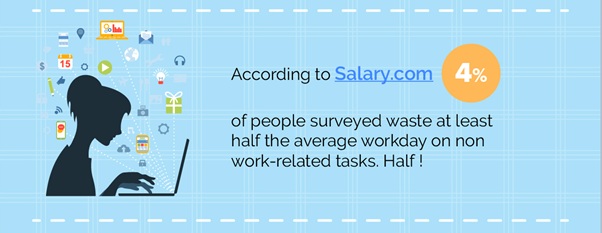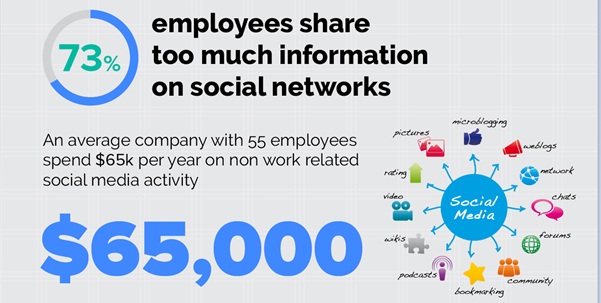How much time do your employees waste at work each day and what can you do about it?
Many companies are facing a situation where employees are habitually wasting of worktime on line. Distractions, Distractions everywhere! Not many people can honestly say they work every minute of every workday. We all take coffee breaks, read some online news or use that spare ’10 minutes’ to check Facebook or Twitter! Taking regular breaks from work is advised as a good way to recharge the mind.
Recent studies show that employees that take a short break once an hour perform better than those who just keep going without a break. Taking a break allows us to get back to the task at hand with renewed energy and sense of purpose making us more productive. It’s also been shown that a break can serve as creative fuel. Habitual time wasting online is something completely different. It’s easy to take a short break from your work and check what’s happening on Facebook or Twitter. Done habitually, though, it can cost the company a lot of money.
Often these occasional breaks do turn into habitual wasting of work time online. In a study by Salary.com, it found that 89% of workers admitted to wasting time at work every day. Of these people, 61% claim to waste between 30 minutes to an hour a day. While this may not seem like much, it can add up to 5 hours a week or 260 hours a year - per employee.
This poses the question where are people going when they waste time online?
- In 2015 the biggest source of distraction was Facebook, with 15% naming it as the biggest online distraction.
- However, in 2014, the survey revealed Facebook to be the second biggest workplace distraction.
- 24% of respondents said Google was the biggest online time-waster, with Facebook in second position at 23%
- And LinkedIn as the third biggest cause of workplace distraction at 14%.
A survey from Pew Research found that a whopping 77% of employees admitted to using social media during work hours.
Top sites during contributing to employee distractions on desktop in 2021 include:
- YouTube
Wasting Time At Work: The Epidemic Continues
The data below is from a Salary.com study, 750 employees were surveyed. Research verdict: the challenge of wasted workplace time is even worse than before.
- 31% waste roughly 30 minutes daily
- 31% waste roughly 1 hour daily
- 16% waste roughly 2 hours daily
- 6% waste roughly 3 hours daily
- 2% waste roughly 4 hours daily
- 2% waste 5 or more hours daily
Which means, according to Salary.com contributor Aaron Gouveia, that 4% of people surveyed waste at least half the average workday on non work-related tasks. Half.

How to manage habitual time-wasting online
Internet usage policy
A sensible approach for organisations to take is to try to reduce non-work related Internet use though an Internet usage policy. The IUP often called the AUP – acceptable usage policy – is a set of ‘guidelines and instructions given to employees concerning the use of Internet facilities such as the web, e-mail and chat conferences. It stipulates all prohibitions such as access to pornographic sites, conducting illegal activities and gambling. The Internet usage policy clearly establishes the rules.
- what is approved internet usage
- what are the penalties for unapproved Internet use at work.
The Internet usage policy is often used as giving the grounds for employee termination and not limiting behaviour beforehand. Employee behaviour and internet use will vary by company so the first step is to map out the specific situation. An internet usage policy does work and allows employers to establish rules that meet their specific needs and block dangerous or time wasting sites.
Be Explicit
An important aspect of any employer policy is to state the terms of the policy clearly, articulate it clearly to employees and incorporate it in the employee handbook. An employer may lawfully monitor all activity on its systems provided it has notified employees of the monitoring and a clearly communicated policy is in place. The most common approach to web filtering is to get employee agreement on the internet usage policy and set up policies to allow then use the internet for some non-work related personal activity. This access can be managed and is good for morale and productivity.
Be Fair – it’s not about blocking internet use
Is it possible to create a middle-of-the-road internet usage policy that limits Internet access within given boundaries without creating privacy issues or a management enforcement nightmare?
The question is about setting reasonable restrictions to tackle a known productivity issue not about prohibiting the Internet. Let’s not ignore the facts, the Internet and social media use in the workplace is a significant productivity issue for many employers. To manage this, many organisations can choose to block specific sites or establish a fair Internet Usage Policy for employees. Both strategies — a blackout and strict usage policy have their disadvantages.
What about logging but not blocking?
With over 30% of workers misusing the Internet, employers are paying dearly for non-work related activity. But overly strict blocking policies can detract talent and drive employees to alternative devices during the workday. Aside from the impact on recruitment, retention and morale, it is virtually impossible to fully enforce an absolute ban on personal Internet use on company equipment. The numbers of employees using work time to surf the Internet is substantial. Faced with this drain on productivity, organizations have clear options.
There are a number of ways to block specific sites. Organisations can block specific domains or IP Address at the network or at the individual browser level. An overly restrictive blocking strategy prohibiting employee access to the Internet could have a demoralising effect and make the company a less attractive place to work.
Age Profile of Work Time Wasters
Millennials get a pretty bad rap. The stereotype is that they are lazy when it comes to work and are addicted to technology, without being able to make it a few hours without checking their smartphones. No matter how untrue (or spot-on) this may be a new survey found that hiring millennials could cost companies some serious cash.
In September of this year recruitment firm Ajilon surveyed 2,000 office workers throughout the U.S., asking about their online habits while they are at work.
The study found that 11% of people spend over an hour at work every day on social media (outside of their lunch break). When you consider that the average hourly wage in the US is $25.69, wasting one hour each day on social media amounts to $128.45 per week and $6,422.50 over a 50-week year.

Unsurprisingly, it is employees aged 18–34 who are most likely to spend over an hour of their working day on social media: 13% do this routinely. For every 100 this 13% cost a company $83,493 per annum.
Conclusion
What can a company do? Here are some practical solutions:
1. Internet usage and behaviour policies.
The big problem in many organisations is awareness. A good employee internet usage policy and discussion around the challenges and expectations of the team and company may be enough to curtail even the most extreme internet misusers (and will allow the backdrop for more productive HR discussions when these problems occur). In relation to millennial workers, a policy that resorts to the removal of personal devices is likely to be resented or totally ignored.
2. Flexible working arrangements.
Increasingly companies are putting greater emphasis on work accomplished rather than hours served. This approach puts trust and accountability on the shoulders of workers while allowing flexibility for the non-work activities if kept within certain limits. If a worker can complete a project and go home early, they are much less inclined to waste time while in the workplace – the workplace is for work and then you go.
3. Content filtering
Implementing a content filter is now a must for businesses. Blocking social media sites is too extreme a measure; however every company must protect itself from the potential liability of employees browsing to undesirable material while at work, as well as blocking the malware that arrives through illegal, malware laden and inappropriate sites.
4. Education & Deterrents.
Many companies now take a more holistic approach to the issue of employees wasting work time on social networks. They are finding that implementing a content filter that blocks all the dangerous and illegal content like porn, gambling, drugs etc. and then allowing employees to surf freely in the knowledge that their activity is being logged is a highly effective approach. As discussed above a ‘log but do not block policy’ can be very effective.
The combination of knowing that all internet activity is being logged and that certain browsing activity is contrary to the company internet usage company is an incentive for employees to spend a greater share of their working hours on actually completed work related tasks.
What are the best strategies you’ve used in your own organization to defeat the epidemic of wasted hours at work? Would you consider logging internet activity but blocking only dangerous / illegal categories of websites?
WebTitan Cloud provides content filtering for organisations to log or block inappropriate websites for organisations, whether they its social media, betting/gambling, pornographic or malware-infected sites. Learn about how WebTitan Cloud can improve your employee productivity today while protecting your organisations from advanced threats.
Talk to our Team today
